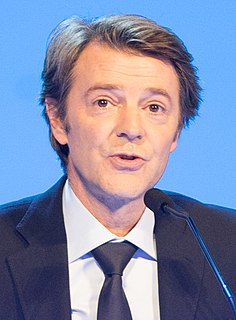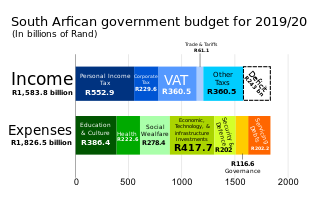Notes and references
Notes
- ↑ Namely:
- inter-municipal associations (syndicats intercommunaux)
- districts
- urban communities (communautés urbaines)
- ↑ Assessed as 16% of the purchase price or 100% of the lease payment if under lease agreement
- ↑ Reduced by 1% each year between 2003 and 2005. The rate was 6% when the tax was abolished on 31 December 2009
Related Research Articles

Jacques René Chirac was a French politician who served as President of France from 1995 to 2007. Chirac was previously Prime Minister of France from 1974 to 1976 and from 1986 to 1988, as well as Mayor of Paris from 1977 to 1995.

France is characterised by numerous political trends. This article provides an overview of some of them.

The Union for a Popular Movement was a centre-right political party in France that was one of the two major contemporary political parties in France along with the centre-left Socialist Party (PS). The UMP was formed in 2002 as a merger of several centre-right parties under the leadership of President Jacques Chirac. In May 2015, the party was renamed and succeeded by The Republicans.

Alain Marie Juppé is a French politician. A member of The Republicans, he was Prime Minister of France from 1995 to 1997 under President Jacques Chirac, during which period he faced major strikes that paralysed the country and became very unpopular. He left office after the victory of the left in the snap 1997 legislative elections. He had previously served as Minister of Foreign Affairs from 1993 to 1995, and as Minister of the Budget and Spokesman for the Government from 1986 to 1988. He was president of the political party Union for a Popular Movement (UMP) from 2002 to 2004 and mayor of Bordeaux from 1995 to 2004.

Nicolas Paul Stéphane Sarközy de Nagy-Bocsa is a French politician who served as President of France from 16 May 2007 until 15 May 2012.
The solidarity tax on wealth was an annual direct wealth tax on those in France having assets in excess of €1,300,000. It was one of the Socialist Party's 1981 electoral platform's measures, 110 Propositions for France. First named IGF, it was abolished in 1986 by Jacques Chirac's right-wing government, but reestablished in 1988 as ISF in slightly different terms after François Mitterrand's reelection.
Taxation in France is determined by the yearly budget vote by the French Parliament, which determines which kinds of taxes can be levied and which rates can be applied.

Patrick Devedjian was a French politician of the Union for a Popular Movement (UMP) party. A close adviser of Nicolas Sarkozy since the 1990s, he was Minister under the Prime Minister in charge of the Implementation of the Recovery Plan, a special ministerial post created for two years following the global financial crisis of 2008, a tenure which commenced in December 2008. He was of Armenian descent. In the night of 28 to 29 March 2020, he died of COVID-19 during the coronavirus pandemic.
A communauté de communes is a federation of municipalities (communes) in France. It forms a framework within which local tasks are carried out together. It is the least-integrated form of intercommunality.
The 23 February 2005 French law on colonialism was an act passed by the National Assembly, which imposed on high-school (lycée) teachers a requirement to teach the "positive values" of colonialism to their students. The law, particularly the aforementioned paragraph and Articles 1 and 13, created a public uproar and drew massive opposition from the left, and Article 4, Paragraph 2 was repealed by president Jacques Chirac (UMP) at the beginning of 2006, after accusations of historical revisionism from various teachers and historians, including Pierre Vidal-Naquet, Claude Liauzu, Olivier Le Cour Grandmaison and Benjamin Stora. Its Article 13 was also criticized as it supported former Organisation armée secrète (OAS) militants.

François Claude Pierre René Baroin is a French politician and lawyer who served as Finance Minister from 2011 to 2012, following a stint as Budget Minister in the government of Prime Minister François Fillon. A member of The Republicans (LR), he was a long-time ally of Jacques Chirac and has been Mayor of Troyes in Champagne since 1995.
French presidential debates, broadcast on TV, traditionally occurred only between the two rounds of the presidential elections.
In 2017, for the first time, a presidential debate took place prior to the first round.

Presidential elections were held in France on 21 and 22 April 2007 to elect the successor to Jacques Chirac as president of France for a five-year term. As no candidate received a majority of the vote, a second round was held on 5 and 6 May 2007 between the two leading candidates, Nicolas Sarkozy and Ségolène Royal. Sarkozy was elected with 53% of the vote.
In Algeria, the most important sources of government revenue have been oil and gas royalties.

The 2010 pension reform strikes in France were a series of general strikes and demonstrations which occurred in France throughout September and October 2010.

Taxation may involve payments to a minimum of two different levels of government: central government through SARS or to local government. Prior to 2001 the South African tax system was "source-based", where in income is taxed in the country where it originates. Since January 2001, the tax system was changed to "residence-based" wherein taxpayers residing in South Africa are taxed on their income irrespective of its source. Non residents are only subject to domestic taxes.
President of the General Council of Corrèze and former First Secretary of the French Socialist Party François Hollande launched his campaign in March 2011 to become the Socialist and Radical Left Party candidate for the 2012 French presidential election and announced that he would be contesting the presidential primary. Hollande made the announcement that he was running for President following his re-election as a department executive. On 16 October 2011 he won the Socialist and Radical Left Party nomination with more than 56% of the votes over First Secretary Martine Aubry, following a long campaign. On 22 April he topped the ballot in the first round of voting in the presidential election, and on 6 May he defeated the incumbent Nicolas Sarkozy in the second round run-off, becoming the new President of France.
Sarkozysm (Sarkozysme) is the name commonly given to the policies and political agenda of former French President Nicolas Sarkozy, including his presidential policies between 2007 and 2012. It can also refer to the supporters of Nicolas Sarkozy within the centre-right Les Republicains (LR).
The solidarity tax on airplane tickets is a surcharge on the civil aviation tax which is destined to finance Unitaid. This tax was initially proposed by Presidents Jacques Chirac of France and Luiz Inácio Lula da Silva of Brazil. It was initially adopted by five founding countries during a conference in Paris on September 14, 2005. Nine countries actually implemented this tax: Cameroon, Chile, Congo, France, Madagascar, Mali, Mauritius, Niger and the Republic of Korea. Norway also contributes through its tax on CO2 emissions.

La France pour la vie is a 2016 political memoir by Nicolas Sarkozy, the former president of France and chairman of The Republicans.
References
- ↑ Published in the JORF of 31 July 1975, pages 7763 and following.
- ↑ Cabanis, André; Anex-Cabanis, Danielle (1986). La société française : aux XIXe et XXe siècles. Privat. p. 213.
- ↑ Article 12 of the Law 75-675 repealing the patente and instituting the professional tax
- ↑ Article 1467 of the Code Général des Impôts as it read on 31 December 2002.
- ↑ "Recettes : 8,6 milliards de francs d'allègements fiscaux" (in French). Le Monde. 1990-09-14. p. 28.
- ↑ Transcript of Senate Debates, Written Question and Answer, 27 March 2003
- 1 2 Martin, Jacques-Olivier (2004-01-07). "Jacques Chirac s'engage à supprimer la taxe professionnelle pour soutenir les entreprises". Le Figaro. p. 2.
- ↑ AFP (23 October 2008). "Taxe pro: investissements exonérés". Le Figaro.fr (in French). Le Figaro. Retrieved 18 November 2020.